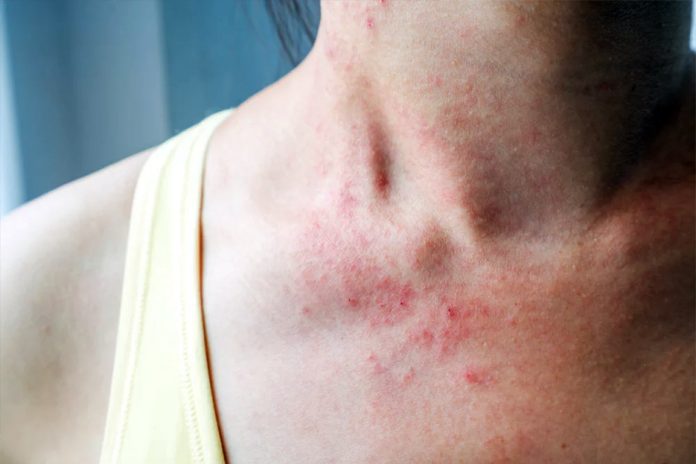Eczema on the Face
Eczema is a group of skin conditions that makes your skin irritated, inflamed, and itchy. Your doctor might also call it dermatitis. It weakens your skin’s barrier function, which protects you from outside elements and helps your skin retain moisture. This means that your skin may easily react to irritants and allergens in your environment.
Eczema can show up anywhere on your body, but one of the most common places is your face, especially on your forehead, cheeks, lips, and chin. You may also get it in and around your ears.
Any type of eczema can appear on your face, with atopic eczema, seborrheic dermatitis, and contact dermatitis being the most common types. And it’s possible to get more than one type of eczema at once.
Contact eczema on the face
Contact eczema (or dermatitis) happens when you come into contact with a substance that irritates your skin or triggers an allergic reaction. This type of eczema doesn’t tend to run in families and isn’t linked to other allergic conditions such as hay fever or asthma.
About 80% of the time, contact dermatitis is caused by exposure to an irritating substance, such as:
- Solvents
- Detergents and soaps
- Bleach
- Nickel-containing jewelry
- Makeup
- Hair dye
- Over-washing with hot water and soap, which can dry your skin out
However, eczema may also come from a reaction that appears a day or two after your skin is exposed to an allergen. Common causes of allergic contact dermatitis are:
- Poison ivy and poison oak
- Nail polish
- Fragrances in skin care products
- Nickel
- Thimerosal, which is a preservative found in some topical antibiotics
Symptoms of Eczema on the Face
You may get patches of eczema anywhere on your face from your chin to your forehead. But your cheeks are the most common site to get flare-ups.
Common symptoms of eczema of the face include:
- Swelling, redness, and irritation (inflammation)
- A rash with skin discoloration, which may be red, purple, or dark brown depending on your skin tone
- Itchy skin
- Dry, flaky, or scaly patches of skin
- Small bumps or blisters
- Wrinkled skin under your eyes
- Sore or uncomfortable skin
Types of Eczema on the Face
There are many kinds of eczema. The types that are often found on the face include:
Atopic eczema
This is the most common type of eczema. Many people first get it when they’re children. People who develop it also tend to have close family members with atopic eczema, asthma, or allergies, such as hay fever.
Atopic eczema tends to develop on the cheeks in infants and toddlers aged up to 2 years. It may also appear around the mouth when your child is weaned. Kids who are a bit older may get it on their eyelids, especially if they have hay fever.
In adults and teens with atopic eczema on the face, it tends to appear on the eyelids or around the lips. The skin around your eyes may also darken, and you may also get an extra fold of skin under your eye (called a Dennie-Morgan fold). Flare-ups of atopic eczema on your face may be related to contact dermatitis because your face often comes into contact with irritants and allergens.
Seborrheic dermatitis
This is one of the most common types of eczema you get on your face as an adult. It causes itchy red patches and greasy scales on your face, especially your forehead, the creases along the sides of your nose, your eyebrows, and behind your ears. You may also get white or yellow flakes on your scalp that can be crusty or powdery.
Contact dermatitis
Contact dermatitis (eczema) happens when you come into contact with a substance that irritates your skin or triggers an allergic reaction. When you get contact eczema on your face, you’ll often get it on your lips, eyelids, and cheeks. It can be caused by skin care products or makeup that contains substances you’re sensitive to, such as dyes and perfumes.
Causes of Eczema on the Face
Doctors don’t know exactly what causes eczema. But they think it’s an interplay between your genes and your environment. For instance, people who have atopic eczema often have a personal and family history of eczema, asthma, or allergies.
Factors that trigger a flare-up of eczema can be different for different people. Common triggers of eczema on the face include:
- Soaps and detergents
- Air that’s too dry or weather with low humidity
- Contact with something you’re allergic to
- Makeup
- Smoke and other pollutants
- Rough or itchy fabric, such as wool
- Emotional stress
Eczema on Face Treatment
Eczema can’t be cured, and it tends to come and go. The best way to treat it will often depend on what triggers your flare-ups. Your doctor will work with you to figure them out so you can avoid your triggers.
Credit: webmd.com









